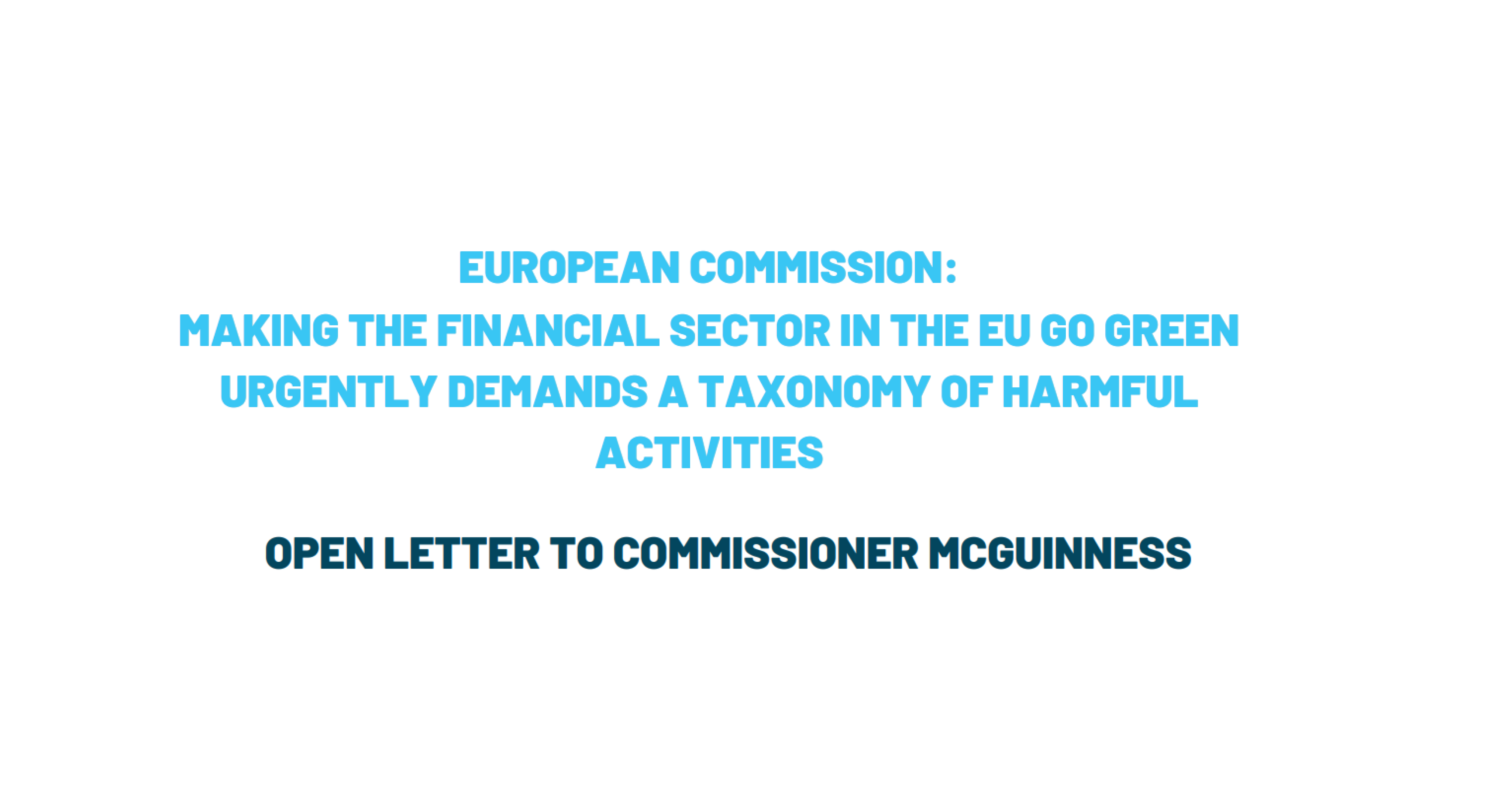Berita
52 civil society organisations urge the EU Commission to establish a classification system of climate and environment harming activities

Change Finance, the network of non-profit organisations and activists that campaign for reforms of the financial sector, alongside 52 organisations has sent an open letter to the European Commission and Mairead McGuinness, the EU finance Commissioner, requesting that the upcoming Renewed Sustainable Finance Strategy includes an ambitious agenda for creating an EU classification system (taxonomy) of activities that harm the climate and the environment. Such a taxonomy is necessary to speed up the financing of a just green transition.
The current framework for the greening of the EU financial system still lacks a critical part
In order for the EU to reach its ambitious objectives of decarbonizing its economy by 2050, the financial sector cannot continue to be counterproductive. However, there is currently a gap between EU ambitions and the actual progress in regulating the financing of such a transition. The European Commission is due to finalise in the coming weeks the first elements of a green taxonomy, a classification system of financial products and economic activities that are sustainable and aligned with the EU transition pathway. This will help avoid greenwashing and strengthen investors and savers’ confidence in green financial products, but that is not enough.
Missing in this framework is a tool to induce the EU financial industry to phase out the financing of the most polluting economic activities. To date, there is still no common EU classification system (taxonomy) of climate and environment harming activities. This prevents the financial sector from having coherent and Paris Agreement aligned divestment strategies that follow a science-based approach. Without such a classification, neither the EU policy makers and supervisors nor bankers are able to steer away from the most climate harming investment and lending strategies.
Taxonomy of harmful activities: a key tool to bridge the gap on climate objectives
In this spirit, and following the demand of the EU and Member States’ financial supervisors, 52 finance organisations, international development organisations, consumer organisations, think-tanks and grassroots groups have made an urgent call to the EU Commission to legislate and establish, as quickly as possible, such a crucial tool. These organisations are warning the Commission not to fall for the false claims of financial lobbyists. Namely, that such a taxonomy of harmful activities is neither useful nor required.
Myriam Vander Stichele, senior researcher at SOMO and former advisor to the Commission in the High Level Expert Group on Sustainable Finance said:
“By quickly establishing an EU standardised list of harmful activities, better supervisory action and regulatory tools, we can reverse the current trend of trillions of euros still financing climate changing and environmentally destructive activities. Such a taxonomy is needed to shift much more financial flows towards facilitating a green and socially just transition. By opposing the creation of such a taxonomy, a large part of the financial sector is, in fact, preventing the EU and its Member States from fulfilling their commitments under the Paris Agreement.”
EU Renewed Sustainable Finance Strategy: the perfect opportunity to accelerate progress
The open letter is timely because the EU Commission, led by its finance Commissioner, Mairead McGuinness, is assumed to finalise and release its Renewed Sustainable Finance Strategy in March 2021. This strategy sets out, for the next 4 years, the European legislative and regulatory efforts aiming to make the EU financial system more climate friendly as well as environmentally and socially sustainable. It is important that the Commission make a strong commitment and present an ambitious agenda for legislating the taxonomy of harmful activities as a part of its renewed strategy.
Till Ehrmann, convener of Change Finance said:
“Commissioner McGuinness told the European Parliament in October that we need to step up our efforts towards greening our financial system. By sending this open letter we show that civil society stands alongside McGuinness and that we will support her in resisting the calls of the financial industry that prioritises its short-term interests over the wellbeing of people and the planet.”
Signatories
- 350.org
- A Well-Fed World
- ActionAid International
- Alliance of Lithuanian Consumer Organisations
- Amazon Watch
- Asociación Elkarcredit de Solidaridad
- Association For Promotion Sustainable Development
- ASUFIN
- ATTAC ESPAÑA
- ATTAC-Togo
- BankTrack
- Both ENDS
- Climatestrike Switzerland (Grève du Climat Suisse)
- Consumentenbond
- Corporate Europe Observatory
- E3G – Third Generation Environmentalism
- Estwatch
- etika
- Euroconsumers
- Facing Finance e.V.
- Fair Finance Guide Netherlands (Eerlijke Geldwijzer)
- Fair Finance International
- Fairfin
- Food & Water Action Europe
- Fossil Free Berlin
- Fridays for Future Berlin
- Fridays for Future Germany
- Fund Our Future
- Fundacja “Rozwój TAK – Odkrywki NIE”
- Gas Free Pensions
- Global Witness
- Milieudefensie – Friends of the Earth Netherlands
- MinervaLab
- Oil Change International
- Positive Money UK
- Profundo
- Rainforest Action Network
- Reclaim Finance
- Repórter Brasil
- Réseau Action Climat France
- Revo Prosperidad Sostenible
- Secours Catholique Caritas France
- Seeding Sovereignty
- ShareAction
- Sinergia Animal
- SOMO
- Spoločnosť ochrany spotrebiteľov (S.O.S.)
- SÜDWIND-Institut
- Talousdemokratia – Economic Democracy Finland
- UCL Institute for Innovation and Public Purpose
- Urgewald
- ZERO – Associação Sistema Terrestre Sustentável